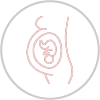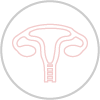The menopause is sometimes known as the “change of life” and is marked by the ending of menstruation (when a woman’s periods stop). The menopause is the end of egg production, which occurs as a result of falling levels of the female sex hormone, oestrogen. A woman’s periods gradually become less frequent until they stop altogether. A woman is said to have reached the menopause once she has not had a period for one year, then she is described as ‘post menopausal’.
From a Women’s Health perspective, the hormonal and biological changes that are associated with a woman going through the menopause, is what causes the woman to feel many physical and emotional symptoms. This fall in oestrogen and progesterone triggers a whole range of symptoms.
Symptoms of the menopause:
- Change in your menstrual pattern
- Hot flushes and night sweats
- Sleep disturbance
- Vaginal symptoms: dryness (atrophic vaginitis), itching, discomfort, painful intercourse
- Urinary symptoms: prone to cystitis, urinary frequency, urgency or incontinence
- Sexual problems: poor arousal, loss of interest, inability to climax, pain, dryness
- Tiredness and lethargy
During and after the menopause, the drop in oestrogen can cause changes in the matrix of your collagen and bone tissue. A woman is at increased risk of reduced bone density and osteoporosis, and increased stretch and laxity of the ligaments and muscles that support joints and organs.
Atrophic Vaginitis: Before the menopause, the skin and tissues around the vagina are kept supple and moist by fluids and mucus. These are made by glands at the neck of the womb, and these glands are directly affected by oestrogen. Oestrogen also affects the tissues in and around the vagina, causing the lining of the vagina to be thicker and more elastic. Oestrogen also stimulates the cells that line the vagina to produce glycogen, a protein which encourages the presence of helpful bacteria which protects the vagina from infection.
After the menopause the ovaries make less oestrogen which leads to a thinning of the tissues around the vagina and reduction in the number of glands that make mucus. The changes essentially make the vagina shorter, less elastic and drier. These changes usually take months or in some cases years to develop after the menopause and can vary from woman to woman. About half of women have some symptoms related to atrophic vaginitis.
In the UK, the average age for a woman to reach menopause is 52. If the menopause occurs in a woman who is under 45 years of age, it is known a premature menopause. A woman is immediately thrown into menopause if she has had a hysterectomy for any reason before natural menopause happens. Most women reach the menopause without seeking medical advice. However, treatments are available which can ease menopausal symptoms that are severe or distressing. These can be discussed with your GP and /or Gynaecologist.
Physiotherapy for Menopause:
- In depth assessment of your gynaecological and obstetric history, including menopausal symptoms
- Physical examination and internal assessment (with consent): to assess skin condition, dryness, pain and sensation, pelvic floor muscle tone, activity, strength and endurance
- Advice for lifestyle….daily activites, work, diet, use of creams/gels, exercise, positioning, sexual activity
- Teaching correct exercises for pelvic floor muscle, abdominals, buttocks
- Teaching general exercises for stamina, strength, fitness and health
- Discuss with your GP re: HRT, oestrogen creams and pessaries



